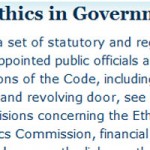Pell, PolitiFact, and Poking
Let’s start by acknowledging that Clay Pell wouldn’t have gotten off with a Mostly True from PolitiFact if he were a Republican:
Clay Pell says that his campaign has created “more jobs in the state of Rhode Island than Narragansett Beer,” a poke at Gina Raimondo’s claim that she helped bring Narragansett Beer back to Rhode Island. …
A major difference is that the Pell jobs are short-term and, one way or the other, most or all will be gone no later than November.
Because the statement is accurate but needs clarification or additional information, we hoist a pint to Pell and rate it Mostly True.
If Pell were a Republican (or perhaps even a conservative Democrat) he wouldn’t have gotten past the midway point of the rating. If the doyens at PolitiFact were feeling relatively objective, that day, he might have gotten the Half True treatment that Cormick Lynch received when he recently made an absolutely true statement about the increasing cost of college, but didn’t meet the exacting standards of people who force truth into a six-level Truth-o-meter by adjusting for inflation. (Lynch is running in the Republican primary for the Congressional seat currently held by Democrat David Cicilline.)
More likely, a GOPell would have gotten the Mostly False that PolitiFact awarded to Republican Mark Zaccaria, who’s running for U.S. Senate against Democrat Jack Reed. Zaccaria had stated that Reed “cast the deciding vote in the Senate for the Affordable Care Act,” which is true of every Democrat in that body, because if a single one of them had voted against ObamaCare, it wouldn’t have had the super majority needed to bring the bill to the floor and pass it.* Wrote PolitiFact, “Because his statement contains some element of truth but ignores critical facts… that would give a different impression, we rate it Mostly False.”
If Pell were a Republican, PolitiFact would have noted that the Gina Raimondo ad that Pell was “poking” wasn’t about Narragansett Beer in isolation, but about all of the companies with which she’s worked on financial matters. The “element of truth” is that his campaign has created more jobs than a single beer company, but if the target of his jibe was Raimondo, his comment omitted the important fact that she was making broader claims about her job-creation record.
Of course, the fact that his jibe is, on the first level, against Narragansett Beer indicates that Clay Pell is like the lead character in a bad sequel, for which the producers had to bring on a different actor to play the hero. Like our current incompetent in chief, Obama, Pell puts forward his campaign for political office as if he’s created a medium-sized business. And like Obama, RI Governor Lincoln Chafee, David Cicilline, and a long list of their co-partisans, Pell’s generic rhetoric claims he’s going to take the high road in politics in the service of the common man.
When it comes down to brass tacks and brass knuckles, though, he’s perfectly happy to belittle the achievements of working people and job creators if it allows him to get in a zinger about one of his fellow super-rich elites.
One begins to wonder whether folks of a certain background become progressives because they’ve never accomplished anything without the advantages of money that somebody else earned and a network of political connections that somebody else made. Maybe they really believe that’s just how the world works, so they want to make government into a universal patriarch and networking service.
* I have to note here the silliness of claiming that the order in which the senators voted makes a difference as to whether one of them was “decisive,” as if they’re all pacing around the Senate chambers agonizing over their decisions and finally hitting their buttons when they’ve made up their minds. It’s not implausible that a senior senator’s early vote on a bill bolsters the resolve of other senators who are wavering. In that sense, it would be fair to call a vote “decisive” even if the margin of victory were greater than one.
Of course, that usage would require some explanation. In the absence of a deeper explanation, the simplest meaning of “decisive” is that an individual senator’s switching his or her vote would have changed the result, and that was true of them all, with ObamaCare.
And the simplest explanation for the Zaccaria PolitiFact result is that the few-person panel that votes on the Truth-o-meter rating likes Jack Reed and wanted to protect him from a potential political liability.


